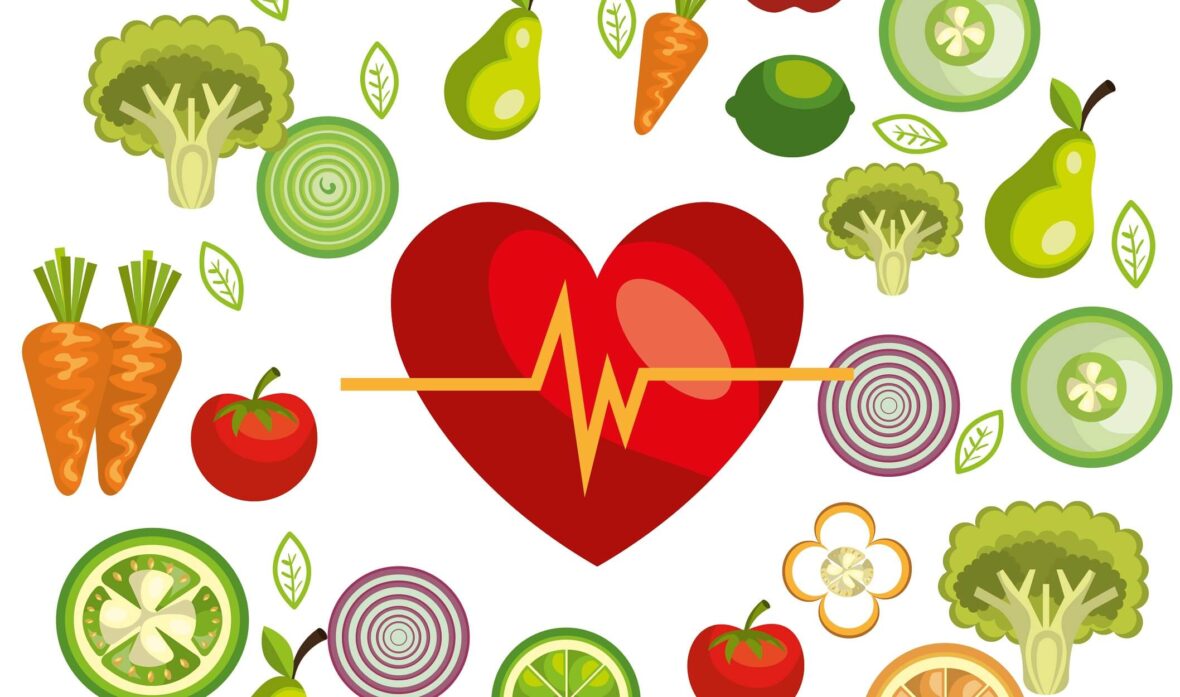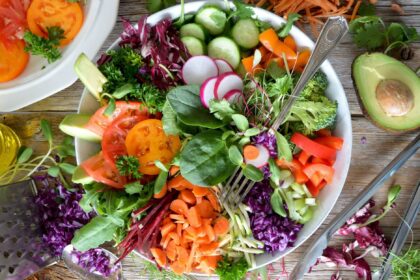Today, many individuals are not taking the necessary time to adhere to a nutritious diet, leading to a variety of health problems, including cardiovascular disease. It is essential to bear in mind that a balanced diet is essential for maintaining healthy cholesterol levels. Consuming nutritious foods can help to maintain cholesterol levels within a healthy range, which can help to reduce the risk of cardiovascular issues, such as heart attack or stroke.
This article review top 12 foods with good cholesterol, including foods that you can incorporate into your diet to improve your cholesterol levels.
What is cholesterol and types of cholesterol?
It’s a type of fat that’s produced in the liver and is found in all the cells in your body, including your blood. It’s really important for your body to work properly, like building cell walls, making tissues, producing hormones, and getting enough vitamin D.
Cholesterol is composed of two main components: LDL cholesterol, which is sometimes referred to as “bad” cholesterol, and HDL cholesterol, which is “good” cholesterol. LDL cholesterol can cause plaque to accumulate in the arteries, narrowing or even blocking them, which can increase the risk of developing coronary heart disease. HDL cholesterol, on the other hand, may be beneficial in protecting against coronary heart disease.

Top 12 Foods with good cholesterol:
If you don’t eat a healthy diet, you could be putting yourself at risk for certain diseases. High cholesterol can make you more likely to develop coronary heart disease, so it’s important to eat foods that lower cholesterol and increase the amount of fats in your body. Eating lots of fruits, veggies, beans, nuts, and other healthy foods is great for your body and helps lower cholesterol. It also helps keep your blood pressure steady and keeps your arteries flexible and responsive, which is good for your bones, digestion, vision, and mental health.
Following some foods are good to lower your cholesterol level:
1. Fatty Fish –
Fatty fish are a great source of omega-3s, which can help protect your heart from inflammation and reduce the risk of stroke. They also help to increase good HDL cholesterol, stop cholesterol from forming in your arteries, and make HDL cholesterol work better. To get the most out of your fish, cook it either steamed or stewed, since fried fish can increase your risk of stroke and heart disease. So if you eat fish 2-3 times a week, you can get a lot of benefits compared to meat. Plus, fatty fish can help lower triglycerides in your bloodstream and protect your heart by preventing abnormal heart beats.
2. Whole Grains –
A number of studies have shown that whole grains reduce the risk of developing heart disease. In fact, some experts have even suggested that consuming three servings a day of whole grains may reduce the risk of coronary heart disease (CHD) and stroke (CVT) by 20%. The benefits may be greater if people eat more servings per day. Whole grains contain more vitamins and minerals, as well as plant compounds and dietary fiber, than refined grains. They also support heart health.
Two grains are particularly important:
- Oats – If you have slightly high cholesterol, eating 70 grams of oats in the form of a porridge or cereal every day can give you 3 grams of soluble fiber, which is enough to help lower your cholesterol. Studies have found that eating oats can really help lower your cholesterol levels over a 4-week period, with LDL cholesterol dropping by 11.6 percent in 28 days. Plus, oats can help lower your total cholesterol by 5%, and LDL cholesterol by 7 percent.
- Barley – Barley is a nutrient-rich grain that is rich in vitamins, minerals, and is highly beneficial for cardiovascular health. It is rich in soluble dietary fiber which has been shown to reduce LDL cholesterol, as well as providing beneficial results for the gut microbiome and blood glucose regulation.
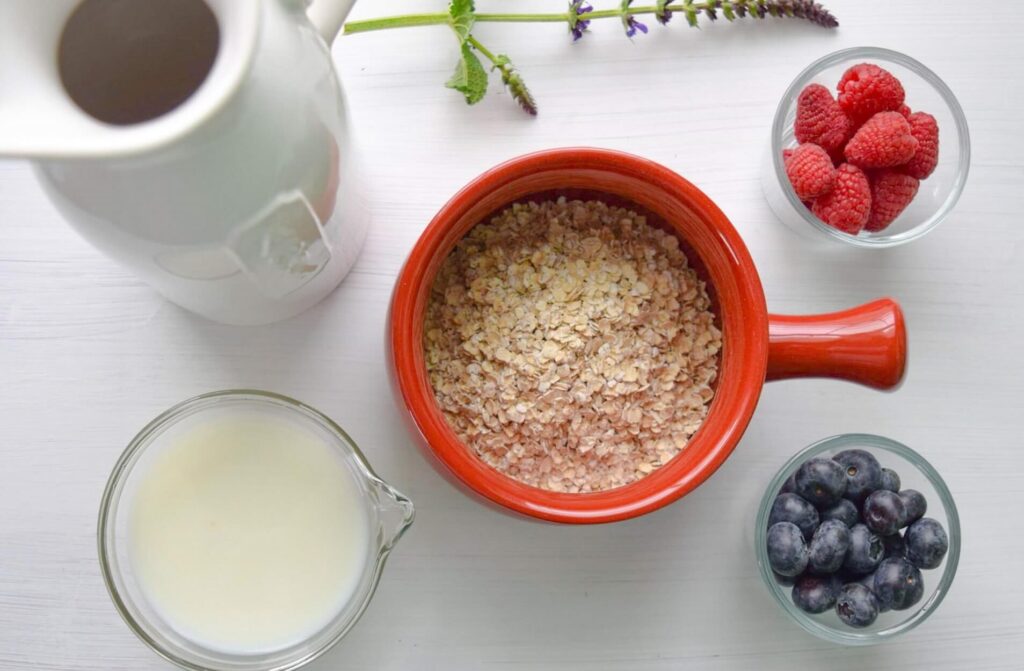
3. Nuts –
Nuts are a great way to keep your heart healthy. They’re packed with unsaturated fats that help lower cholesterol, as well as fiber and minerals. Most types of nuts are suitable for heart health, like almonds and pecans. Walnuts are high in omega-3s, which are polyunsaturated fats that are linked to heart health. Plus, almonds and other nuts are packed with L-arginin, which helps your body make nitric oxide and helps keep your blood pressure in check.
They also block cholesterol from being absorbed in your intestines and contain calcium, magnesium, and potassium, which can help lower your risk for heart disease. So grab a handful of nuts every day to keep your body healthy!
4. Avocado –
Avocados are a particularly nutritious fruit, not only providing essential nutrients for the heart, but also monounsaturated fat and fiber, both of which are known to reduce cholesterol levels. This diet has the potential to increase the risk of cardiovascular disease, particularly by decreasing bad LDL cholesterol levels while simultaneously decreasing good HDL cholesterol levels. However, it also has the potential to reduce the incidence of heart disease and stroke.
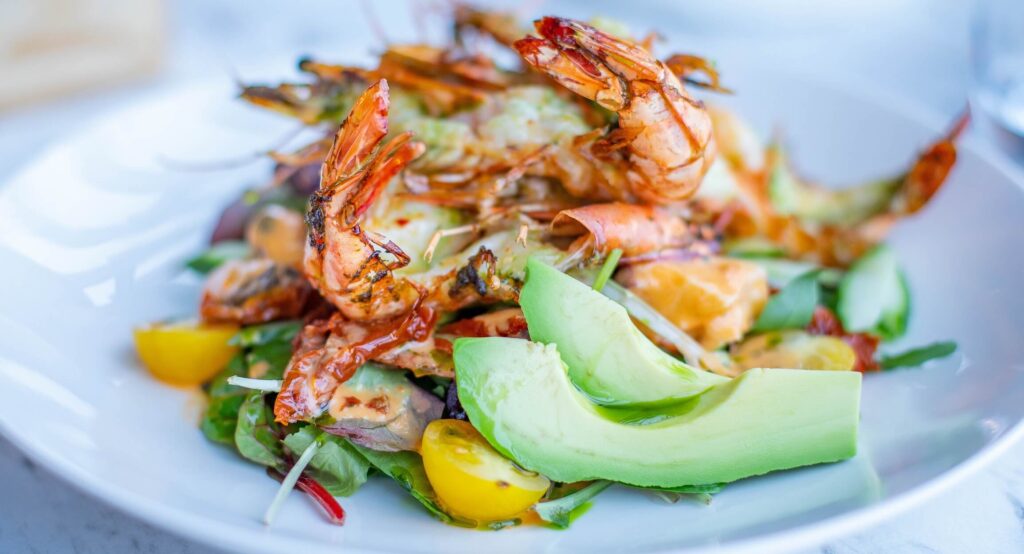
5. Extra virgin olive oil –
Extrinsic Olive Oil is a widely used cooking oil that is part of the Mediterranean diet, which is known for its heart-healthy lifestyle. It is an ideal substitute for saturated fats, such as butter, and is rich in Monounsaturated Fatty Acids (MFA). This may help to increase good HDL cholesterol levels and reduce bad LDL cholesterol levels. Additionally, it has anti-inflammatory and antioxidant properties that can have a positive impact on cardiovascular and general health. This plant-based fat can be used as a substitute for animal fats, and can help to reduce cholesterol levels and improve overall cardiovascular health.
6. Garlic –
For centuries, garlic has been used in both cooking and medicine, and it’s got a ton of health benefits. It’s got lots of powerful plant compounds that can help reduce LDL cholesterol, as well as other risk factors for heart disease. It’s a great addition to a lot of dishes, and you need a lot of garlic to get the full effect.
7. Green tea –
Green tea contains catechins which are antioxidants that can be very beneficial for your health. It helps to activate nitric oxide which is good for your blood pressure. It also prevents cholesterol synthesis and absorption, and helps to prevent blood clots. Consuming green tea significantly improves your cholesterol levels. It reduces LDL cholesterol levels, but not HDL cholesterol levels. Compared to other teas, green tea has many health benefits, such as reducing the risk of heart disease.
8. Legumes –
Legumes are a great plant-based food that’s packed with fiber, minerals, and protein. They’re also a great substitute for meat. Plus, they don’t raise your blood sugar levels and can help reduce your chances of heart disease.
9. Soy –
Soy beans and soy products are suitable for a low-cholesterol diet. Soy milk, soy yogurt, and tofu are examples of soy-based foods. Studies have shown that soy protein can lower low-density lipoprotein (LDL) cholesterol levels in adults by about 3–4% and may improve heart health. Soy foods help to lower bad LDL cholesterol and raise good HDL cholesterol. It is very effective for people with high LDL cholesterol. It is a plant-based diet for heart health.
10. Dark chocolate –
Dark chocolates are made with cocoa, which is a plant-based ingredient. Cocoa has lots of health benefits, like antioxidants and anti-inflammation. It can help lower LDL cholesterol and blood pressure, as well as raise HDL cholesterol. But it’s important to eat dark chocolate in moderation, since it can be loaded with saturated fat and sugar, which can lead to heart disease.
11. Fruits –
Fruits are beneficial for heart health because they contain soluble fiber which helps to reduce cholesterol. They also contain bioactive compounds which help to prevent heart disease and other chronic diseases because of their antioxidant and inflammatory properties. Berries and grapes contain plant compounds which can help to improve good HDL and reduce bed LDL cholesterol levels. Berries include blackberries and blueberries, as well as raspberries and pomegranates. These fruits also contain soluble fiber and low sugar content. Apple, banana and pears also contain soluble fiber but they contain more sugar.
12. Vegetables –
Vegetables are a key part of a healthy diet, and they’re packed with fiber and antioxidants. Plus, they’re low in calories, so they’re essential for keeping your weight in check. Pectin is a type of fiber that helps lower cholesterol, and dark leafy greens like kale and spinach have lutein and carotenoids that are linked to lower heart disease risk. Non-starchy veggies like asparagus, cabbage, broccoli and cauliflower are also high in fiber and protein, and they can help lower triglycerides, which can be a risk factor for heart disease.
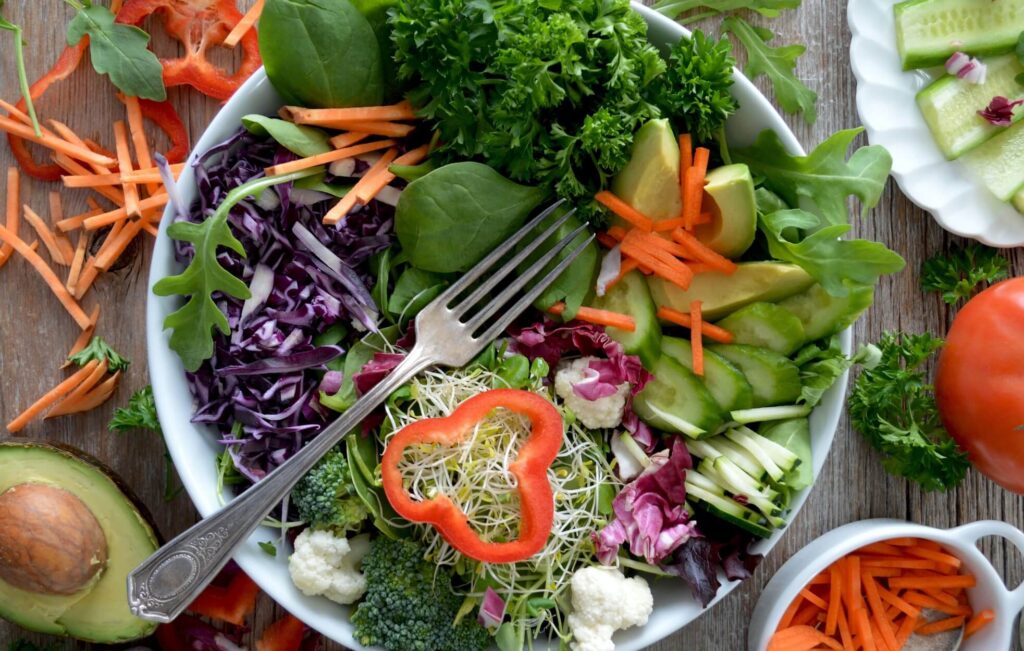
Which is best low cholesterol diet plan?
Following meals tips may be beneficial for lowering cholesterol:
| Breakfast | Oatmeal, topping with apple, pear, berries, almonds Avocado & berry smoothie Oatmeal pancakes with cinnamon, Apple and peanut butter on whole grain toast. |
| Lunch | Vegetables and hummus in whole grain pita vegetable soup or broth-based lentil soup Mediterranean vegetable stew with barley salad topped with roasted veggies and avocado. |
| Snacks | Raw vegetables dipped in hummus or guacamole Low fat or fat free yogurt Whole grain pretzels or crackers Roasted chickpeas or edamame Fresh or frozen fruits Rye crisps with tuna A handful of seeds and nuts Apple slices with almond butter A bar made from oats, nuts, and dried fruit. |
| Dinner | Grilled salmon with chickpeas Poached salmon with asparagus and brown rice Tuna burger with wasabi mayo Oatmeal, pancakes with cinnamon apples Whole wheat pasta with chicken and brussels sprouts tossed in olive oil. |
How high cholesterol can be lower with diet?
If you’re dealing with high cholesterol, it’s important to stay on top of your diet and stay active. You can do this by eating right, keeping track of your weight, and taking medicines to lower your cholesterol. To keep your cholesterol in check, it’s best to follow a heart-healthy lifestyle. That means limiting your total fat and saturated fat intake, and only eating the calories you need.
Saturated fat comes from things like dairy, chocolate, and baked foods, but it can also be found in meats, fried and processed foods. Trans fat is bad for you, as it can raise LDL cholesterol and lower HDL cholesterol. To get healthy fats, try to get them from lean meats and nuts, as well as oils like safflower and canola.
What are the causes of high cholesterol?
Few reasons of high cholesterol include:
- Genetics – this may happen in your family history may affect your cholesterol level.
- Smoking is also lead to high cholesterol levels.
- Lack of physical activity and exercise.
- Low consumption of healthy fats and foods containing fiber.
- High consumption of foods containing unhealthy fats (saturated fats and trans fats).
- Being bulky or obese and having too much body fat around your middle.
What are high cholesterol foods?
Saturated and trans fats are two of the most common sources of cholesterol in the human body. These fats are found in a variety of foods, including meat, dairy, and processed foods like bread and fried foods. Eating these foods can increase the amount of bad LDL cholesterol (bad cholesterol) in your blood, which can lead to heart disease or other cardiovascular problems. To maintain a healthy diet and improve your heart health, it is important to limit your intake of high cholesterol foods and switch to healthier alternatives.
Conclusion:
In order to lead a healthy lifestyle, it is essential to be mindful of one’s diet. Not only does this help to maintain low LDL cholesterol levels, but it can also reduce the risk of cardiovascular disease. To ensure a balanced diet, it is recommended to include high fiber foods such as fruits, vegetables, and whole grains in one’s routine diet plan. Additionally, it is important to limit the intake of foods that are saturated fat, as they can lead to elevated High Cholesterol levels, which can be a major contributing factor to cardiovascular disease, stroke and obesity. Additionally, mindful eating should be practiced to ensure that one is enjoying their meal and feeling full without overindulging.
FAQ
What are the top foods that can lower cholesterol naturally?
Eating foods that are rich in soluble fiber, such as oatmeal, can help to reduce cholesterol levels naturally. Additionally, consuming a variety of antioxidant-rich and soluble fiber-rich fruits and vegetables, such as apple, grape, and citrus fruit, can also help to lower cholesterol levels. Finally, consuming healthy fats, such as avocado and olive oil, can help to promote a healthy diet and reduce cholesterol levels.

How does the consumption of oatmeal and oat-based products affect cholesterol levels?
Consumption of oats and other oatmeal-based products has been found to have a beneficial effect on cholesterol levels, as they contain a high amount of soluble fiber which reduces the rate at which cholesterol is absorbed into the body. Studies have demonstrated that regular oats consumption can lead to a decrease in LDL cholesterol levels, thus decreasing the likelihood of developing cardiovascular diseases. Therefore, incorporating oats into one’s diet is a viable and effective approach to managing cholesterol levels and promoting heart health.
What are some healthy cooking oils that can help in lowering cholesterol?
Cooking oils that are beneficial for cholesterol levels can be found in a variety of sources, including olive oil, avocado oil, and polyunsaturated fat oils. Olive oil has been linked to improved cholesterol profiles, while avocado oil has been found to increase levels of HDL cholesterol while decreasing levels of LDL cholesterol. When consumed in moderation, these oils can help to maintain healthy cholesterol levels.
How does incorporating fiber-rich foods help in reducing cholesterol levels?
Fiber-rich foods help lower cholesterol levels because they bind to cholesterol in your digestive tract, preventing it from being absorbed into your bloodstream. Soluble fiber, such as found in oats, beans and fruits, has been shown to specifically lower bad LDL (low-density lipoprotein) cholesterol. Adding fiber to your diet can also help you feel fuller, which can help with weight management and is linked to better cholesterol levels.
Can nuts and seeds really help lower bad cholesterol levels?
Nuts and seeds are a great way to keep your cholesterol levels in check. They’re packed with unsaturated fats and fiber, plus they contain plant sterols that can help lower LDL cholesterol. Eating nuts and seeds as part of a healthy diet can help lower your cholesterol, but it’s important to be mindful of how much you eat. Too much of them can cause you to gain weight, which can have a negative impact on your cholesterol levels.
Are there any specific fruits that are known for reducing cholesterol?
Fruits like apples, oranges, and grapes have been linked to lower cholesterol levels, thanks to their high fiber, antioxidant, and plant compound content. Eating them regularly can help keep your heart healthy and keep your cholesterol levels in check.
What is the role of omega-3 fatty acids in lowering cholesterol?
Eating foods like salmon, mackerel, chia seeds, and walnuts can help keep your cholesterol levels in check. Omega-3 fatty acids are really important for lowering cholesterol, as they help reduce triglycerides in your blood and raise HDL cholesterol. Plus, they can help reduce inflammation, which can help your heart health by preventing plaque from forming in your arteries.
Which vegetables are best for lowering cholesterol levels?
Consumption of leafy greens such as spinach, kale, collard greens, and other cruciferous vegetables can help lower cholesterol levels. Leafy greens are packed with antioxidants and fiber, while cruciferous vegetables, such as broccoli, Brussels sprouts, and Brussels sprouts, are packed with compounds that may help reduce bad LDL (low-density lipoprotein) cholesterol levels. Eating a wide variety of vegetables can help improve cholesterol management and improve your overall heart health.
Reference Used:
https://www.health.harvard.edu/heart-health/11-foods-that-lower-cholesterol
https://www.medicalnewstoday.com/articles/foods-that-lower-cholesterol
https://www.healthline.com/nutrition/13-foods-that-lower-cholesterol-levels
https://www.webmd.com/cholesterol-management/ss/slideshow-cholesterol-lowering-foods
https://www.nhs.uk/conditions/high-cholesterol/how-to-lower-your-cholesterol/


